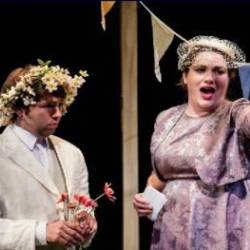Albert Herring (Upstairs at the Gatehouse)
Although Britten’s chamber opera is that rare beast, a lyric comedy that’s genuinely funny, its parochial mood makes it hard to bring off – or, at least, to convince an audience that it ought to be an opera at all. Take away the music and what remains is a dated church-hall entertainment.

© Richard Davenport
That’s because operas, including most of Britten’s own, tend to explore deep issues in a heightened way. Otherwise what’s the point? Even Verdi’s Falstaff is peopled by complicated characters. But everyone in Albert Herring is provincial and the libretto, adapted by Eric Crozier from a short story by Maupassant, is humdrum.
A dearth of suitably virtuous girls in a fictional Suffolk town (another such, after Peter Grimes) leads to a young man, greengrocer’s assistant Albert, being chosen as the festive May King. He’s given prize money that he uses to get drunk and (probably) laid, after which, feeling manned up, he rebels against his claustrophobic community. That’s it.
The composer’s alchemy, though, raises Herring above the mundane. It’s another of his tales of innocence corrupted – albeit in a friendlier way than most – and he treats it to some blissful music. The score’s brightness never cloys or falls into the trap of over-simplicity, and the threnody sung by the town worthies when they think Albert has perished is one of his most glorious inspirations.
While Hampstead Garden Opera‘s new production is beautifully underpinned by a dozen crack chamber players under Oliver-John Ruthven, director Joe Austin never quite breaks free of the am-dram trap. The piece is delivered rather than interpreted and he does little to exploit scenic opportunities such as the extended interlude midway through Act 2. There are dead moments, even when the stage is full, during which his players seem content to wear their costumes and sing the notes.
Much of this is down to the youth of his company. Professional singers they may be, but if some of the town’s elders were older they might find it easier to create plausible characters. Unclear diction from a key singer proved to be an additional problem – and a surprising one in such a small venue.
All these moans… so why did I have such a great time? First, Austin and Ruthven clearly love this piece to bits – as do I, despite my reservations about it – and their enthusiasm is infectious. Second, it’s great to hear so many excellent young voices, and to know there’s an alternate cast on other nights that’s likely to be just as good.
Mostly, though, it’s the joy of discovering individual performers I want to hear again. Tenor Tom Morss is a simply wonderful Albert – and how pleasing it was to hear him in a decent opera after last summer’s woeful Madame X. Hangdog and befuddled until his transformation during one night in Bangkok, Suffolk-style, he characterised him brilliantly.
Nick Dwyer and Rosemary Clifford as Sid and Nancy shared Morss’s built-in advantage of being the right age for their parts, and both were superb – as was Jessica Gillingwater as Mrs Herring, even though she needs to stay more firmly in character when she’s not the focus of a scene.
For audiences unfamiliar with Albert Herring this production offers a rewarding entrée in to its charms. I suspect that Britten himself, a noted champion of young artists, would have been more than happy with it.










